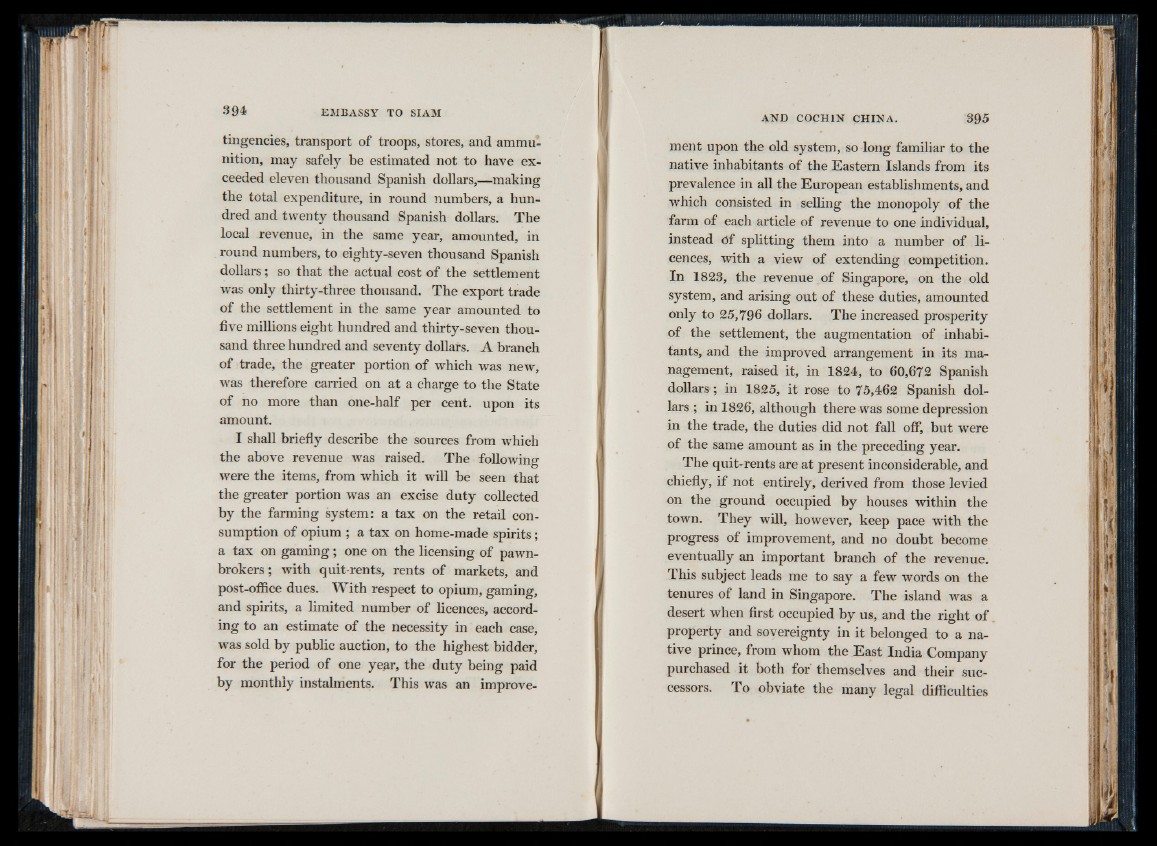
tingencies, transport of troops, stores, and ammunition,
may safely be estimated not to have exceeded
eleven thousand Spanish dollars,—making
the total expenditure, in round numbers, a hundred
and twenty thousand Spanish dollars. The
local revenue, in the same year, amounted, in
round numbers, to eighty-seven thousand Spanish
dollars; so that the actual cost of the settlement
was only thirty-three thousand. The export trade
of the settlement in the same year amounted to
five millions eight hundred and thirty-seven thousand
three hundred and seventy dollars. A branch
of trade, the greater portion of which was new,
was therefore carried on at a charge to the State
of no more than one-half per cent, upon its
amount.
I shall briefly describe the sources from which
the above revenue was raised. The following
were the items, from which it will be seen that
the greater portion was an excise duty collected
by the farming system: a tax on the retail consumption
of opium ; a tax on home-made spirits;
a tax on gaming; one on the licensing of pawnbrokers
; with quit-rents, rents of markets, and
post-office dues. With respect to opium, gaming,
and spirits, a limited number of licences, according
to an estimate of the necessity in each case,
was sold by public auction, to the highest bidder,
for the period of one year, the duty being paid
by monthly instalments. This was an improvement
upon the old system, so long familiar to the
native inhabitants of the Eastern Islands from its
prevalence in all the European establishments, and
which consisted in selling the monopoly of the
farm of each article of revenue to one individual,
instead Of splitting them into a number of licences,
with a view of extending competition.
In 1823, the revenue of Singapore, on the old
system, and arising out of these duties, amounted
only to 25,796 dollars. The increased prosperity
of the settlement, the augmentation of inhabitants,
and the improved arrangement in its management,
raised it, in 1824, to 60,672 Spanish
dollars ; in 1825, it rose to 75,462 Spanish dollars
; in 1826, although there was some depression
in the trade, the duties did not fall off, but were
of the same amount as in the preceding year.
The quit-rents are at present inconsiderable, and
chiefly, if not entirely, derived from those levied
on the ground occupied by houses within the
town. They will, however, keep pace with the
progress of improvement, and no doubt become
eventually an important branch of the revenue.
This subject leads me to say a few words on the
tenures of land in Singapore. The island was a
desert when first occupied by us, and the right of
property and sovereignty in it belonged to a native
prince, from whom the East India Company
purchased it both for themselves and their successors.
To obviate the many legal difficulties